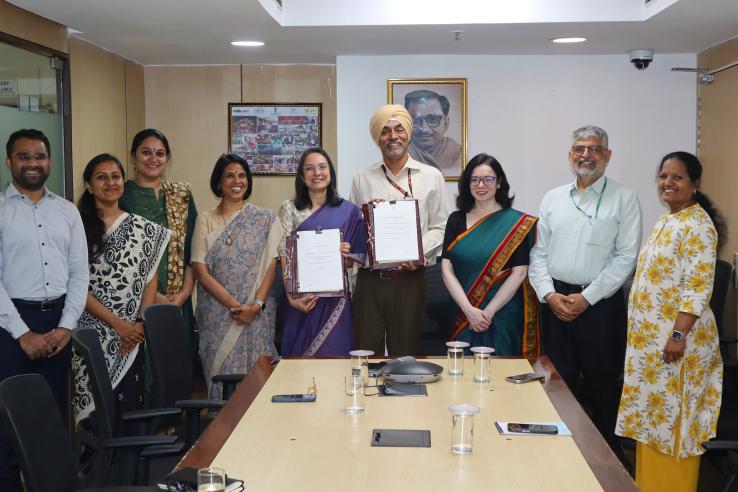Ministry of Rural Development partners with J-PAL South Asia as it expands ‘Samaveshi Aajeevika’ across India

The Government of India’s Ministry of Rural Development (MoRD) has brought the Abdul Latif Jameel Poverty Action Lab (J-PAL) South Asia at IFMR on board as a knowledge partner on ‘Samaveshi Aajeevika’, a comprehensive livelihoods programme designed to put rural women on the path to self-sufficiency.
The ‘Samaveshi Aajeevika’ programme will adapt BRAC’s Graduation Approach, a comprehensive livelihoods programme that randomised evaluations by researchers affiliated with J-PAL and Innovations For Poverty Action have found to be effective in lifting the poorest of the poor households out of extreme poverty.
As part of this partnership, J-PAL South Asia will support the MoRD in catalysing the adoption of scientific evidence and data in their decision-making as it expands Samaveshi Aajeevika in India.
‘Samaveshi Aajeevika’ will comprise business training, life-skills coaching, and short-term financial support and will be administered to rural women across India through MoRD’s flagship livelihoods programme Deendayal Antyodaya Yojana - National Rural Livelihoods Mission (DAY-NRLM).
The MoU was signed in the presence of Charanjit Singh, Additional Secretary, Rural Livelihoods, Ministry of Rural Development, Smriti Sharan, Joint Secretary, Rural Livelihoods, Ministry of Rural Development, Nivedita Prasad, Deputy Secretary, Department of Rural Development, Raman Wadhwa, Director, DAY-NRLM, and Usha Rani, IBCB SISD and HR, NRLM, Shobhini Mukerji, Executive Director, J-PAL South Asia and Sharanya Chandran, Director, Policy and Communications, J-PAL South Asia.
Central to this partnership is the creation of an ecosystem working towards sharing detailed evidence, bridging knowledge gaps, and cultivating confidence for the successful adoption of the Graduation Approach across different states and contexts, nationwide.
Additional Secretary, Rural Livelihoods, Ministry of Rural Development, Charanjit Singh, said that it is important for any programme under implementation to get feedback in real time and this MoU will help in this process.
J-PAL South Asia will also collaborate with MoRD to set-up a Gender Impact Lab to conduct new research and institutionalize data use within NRLPS-DAY-NRLM for driving women-led development.
J-PAL South Asia’s partnership with MoRD is generously supported by ASPIRE, a joint initiative by J-PAL South Asia and Veddis Foundation, set up to drive impactful change on a large scale.
The Government of India’s DAY-NRLM is one of the largest community mobilization efforts in the world, organizing more than 9.99 crore women into over 90.4 lakh self-help groups, and more than 4 lakh primary and secondary level federations. The program promotes sustainable livelihoods and helps women build up their savings. But above all, it empowers them to lead dignified lives.
India has made significant strides in reducing extreme vulnerability over the last decade, but approximately 19.5 crore people continue to live in multidimensional poverty, according to Niti Aayog’s Multidimensional Poverty Index Progress Report 2023.
First implemented in Bangladesh in 2002, the Graduation Approach has been rigorously tested in seven countries by researchers affiliated with J-PAL and Innovations for Poverty Action. Their findings suggest the households receiving the full package of support had greater spending power, ate regularly, and had higher income and savings.
In India, an evaluation in West Bengal’s Murshidabad district led by J-PAL co-founders and Nobel Laureates Abhijit Banerjee and Esther Duflo found that the program's effects persisted even after a decade. Between 2015 and 2019, J-PAL South Asia and NGO Bandhan-Konnagar piloted the Graduation Approach model in Jharkhand, Odisha, Rajasthan, and Bihar.
There is an urgent need for programs like the Graduation Approach — which are underpinned by rigorously tested policy interventions — to be replicated across multiple regions for maximum impact.
Shobhini Mukerji, Executive Director, J-PAL South Asia, said: “Graduation Approach is a big boost to Government of India’s vision for women-led development. MoRD has shown phenomenal leadership in embracing scientific evidence and data in their decision-making. Samaveshi Aajeevika is a powerful reminder that a robust ecosystem of governments, academic institutions, and civil society organizations is vital to drive impact at scale.”
J-PAL South Asia will also collaborate with a MoRD-led coalition comprising state governments and civil society organizations to share its lessons and insights from SJY’s implementation.
J-PAL South Asia, together with Bandhan-Konnagar, has been working with the Government of Bihar’s JEEViKA since 2018 to support the expansion of Satat Jeevikoparjan Yojana (SJY), estimated to be the largest government-led scale-up of the Graduation Approach in the world. SJY is on track to reach 200,000 women-headed households by 2024 across Bihar.